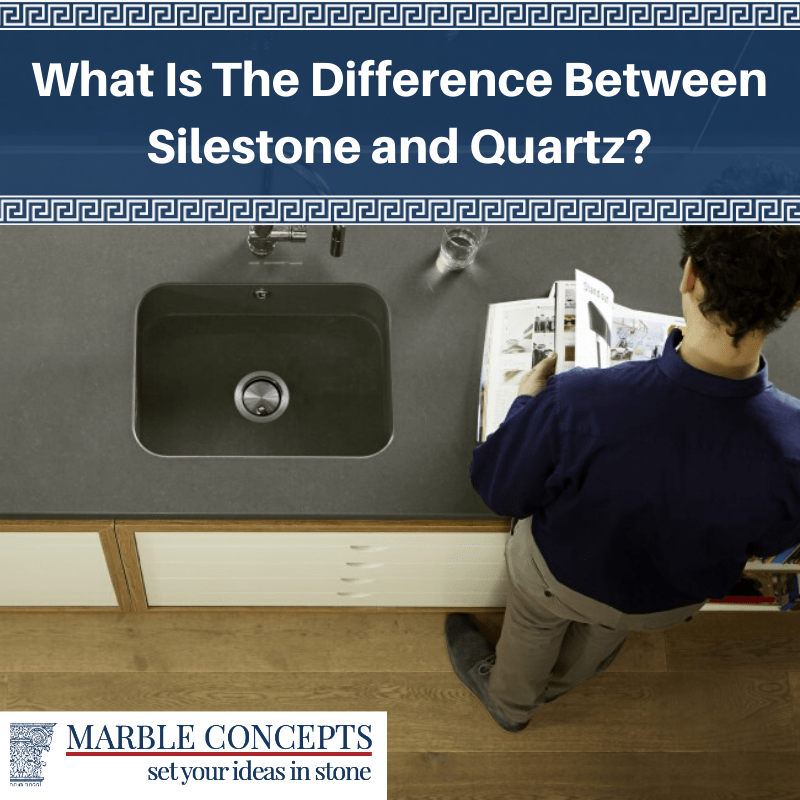Quartz is a popular material choice for home builders and manufacturers of countertops, bath surfaces, kitchen backsplashes, and even flooring. There are some really great advantages of using quartz instead of fully natural stone materials like marble, limestone, and granite.
Many homeowners prefer to install beautiful quartz surfaces in their kitchens and baths. However, many consumers ask – What is the difference between Silestone and quartz?
The comforting answer is really nothing because Silestone is simply a brand name of a popular quartz countertop and other surface material made with natural quartz crystals and other ingredients. The gorgeous and sparkly quartz crystals are expertly melded with durable polyester resins and other blended materials in a complex engineering process.
Advantages of Silestone and/or Quartz Over Other Materials Like Natural Marble or Granite
There are some definite advantages of using Silestone and/or quartz over other material choices like natural marble or granite among others.
These advantages include:
- Durable & resistant to scratches & stains on the surface
- Lighter color choices than darker granite or marbles
- Needs little cleaning & maintenance
- As an engineered material, Silestone aka quartz offers a more consistent design pattern throughout
- Surface is sealed with an impervious sealant that resists stains, scratches and won’t hide germs in fissures/cracks like natural stones may if not sealed properly
- Comes in a wide array of gorgeous color options and pattern designs suited for a wide range of decor styles
- Easier to keep clean
- Homeowners get a realistic expectation of their custom counter material design before manufacturing process – granite and marble results may vary significantly
- Adaptable & complementary to almost any space or design style
- Less likely to stain from acidic foods, beverages and other spills that typically stain
- Has a brighter and lighter appearance than some darker marbles or granite slabs
Possible Disadvantages of Silestone or Quartz VS Granite/Marbles
Even though Silestone and other quartz brands do have many terrific advantages, consumers should weigh in some possible disadvantages when deciding on a countertop or other surface material like marble and granite among others.
Some disadvantages could include:
- May break with rough use – avoid dropping heavy objects on this surface
- Breakage might require expensive repairs or even replacement
- Can sustain heat damage if extensive
- Sealant can wear down over time if some care is not taken
- Can be pricier for initial installation
Natural Stones VS Man-Made Materials
There are both pros and cons to natural stones used in kitchen and bath surfaces versus man-made materials like Silestone and other quartz brands of surface materials currently on the market. Consumers should do some research, and plan to ask plenty of questions from your chosen quartz and/or Silestone countertop and other surface material retailer or specialist before making that all important final decision.
Some pluses of man-made or engineered countertop material like Silestone versus natural stones like marble, granite or limestone should also be considered. These bonuses include:
- Silestone doesn’t need resealing
- Engineered counter materials are non-porous & won’t harbor germs below the surface
- While the quartz is natural – quartz countertops like Silestone are blended with engineered substances like polymers – don’t be fooled by the name
- Quartz, including Silestone, can fade in direct sunlight – granite will not
- Silestone & other quartz countertop materials may burn or char if hot pans are placed directly on it – granite and other natural stones are less likely to sustain heat damage
- Granite is easier and less expensive to repair versus repair jobs for damaged quartz counters like Silestone
- Silestone & quartz is heavier than granite – quartz countertops also need more expertise during installation
- Takes more time for stains to develop with quartz/Silestone versions – granite, marble & other materials stain quicker due to their porous nature
- Silestone is more versatile for use – adapts to any size space & looks best for contemporary & open floor plans
- Quartz surfaces like Silestone are fantastic for high-traffic areas – mudrooms, bathrooms, floors & laundry areas
Conclusion:
Quartz countertops, such as Silestone brand, offer many benefits. Learn more by contacting Marble Concepts.






